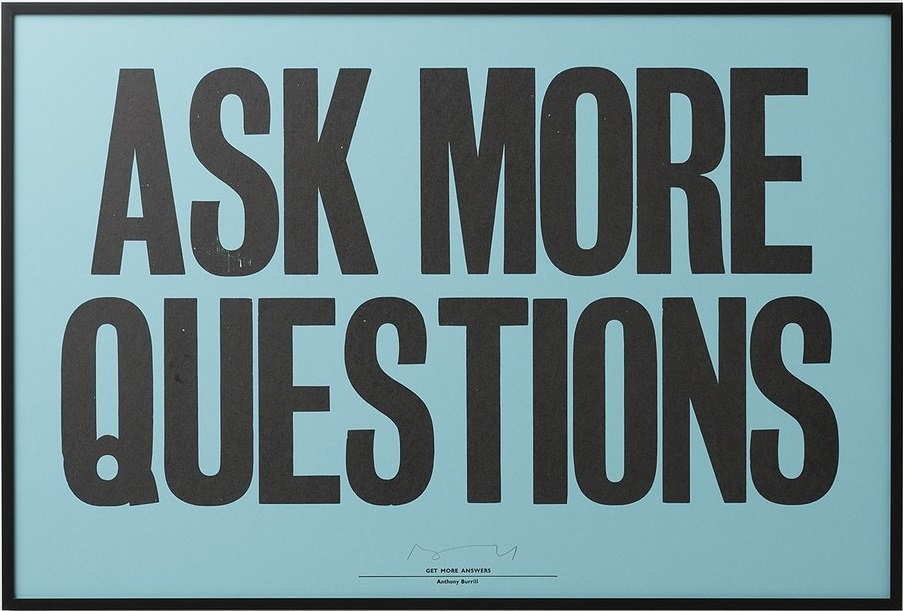I was recently asked to list out the values I look for in a person (when hiring), or a team or company (when looking for a job). Since The Joel Test, and its several updates is a thing, I am tongue-firmly-in-cheek calling this The Heisel Test.
The Heisel Test: Five questions for professional happiness

Credit: Anthony Burrill
- Do you put customer value and experience first?
- Do you move responsibly fast?
- Are you genuinely curious and open to new information?
- Do you empower your teams and teammates?
- Do you respect and have empathy for people?
Do you put customer value and experience first?
Why is this important? Well no matter what you do, you have (or hope to soon have) customers. You won’t be in business long without them.
There’s a good chance you have a really interesting mix of external customers who pay you in dollars, and internal customers who pay you in good will and cooperation.
You’re relentlessly focused on solving a real customer problem to add customer value. But you don’t stop there! You want your customer’s experience using your product and engaging your services to be as positive, fast, and frictionless as possible.
Organizations have inertia, and this inevitably leads people and teams to tailor vital aspects like workflow, culture, requirements, and budgets for themselves rather than the customer.
You have to keep constant vigilance and optimize the whole rather than the natural tendency to optimize locally for the person, team or business unit.
You don’t want to complete a set of tasks or features for a customer. You want to solve their problem. That means you measure yourself by more than work completed, progress percentage, or hours billed. You measure yourself primarily by customer satisfaction.
Do you move responsibly fast?
You want to move as fast as possible because you assume you’re wrong until you get feedback from actual customers (see No. 1 above) that you got it right.
You balance that desire for speed by moving responsibly fast — balancing time-to-feedback against reckless behaviors that could irreparably harm your customer experience and your teammates.
That often means you’re focused on building quality in, and delivering less that works well rather than more that works poorly. You generally prefer small steps that move you toward your goal because you’ll learn more, and learn faster than taking a large step.
You approach decisions and actions thoughtfully. You consider whether it’s a Type 1 or Type 2 decision, and whether it’s close enough to the last responsible moment to make that decision.
You don’t rush in without an appropriate level of planning and thought given what you understand the magnitude of potential failure to be.
Are you genuinely curious and open to new information?
When things inevitably don’t go as planned, your curiosity sets you up well to understand where you are. You devise questions and experiments designed to answer them. You adjust your plans based on those learnings.
Your ego is not so big as to disregard information you see directly and hear indirectly from your teammates. When things fail, and doubly so when they succeed, you are genuinely curious as to what led you there.
Your curiosity has you taking Gemba walks literally and figuratively to see how your teammates work, and to find out what’s working well and what’s not.
You’re in constant search of objective and subjective data. That data is feedback into a virtuous circle of behavior. The result of that feedback loop is more value and an improved experience for your customers.
You seek information to understand what decision making mode to use based on the situation you’re in.
Do you empower your teams and teammates?
No firm consists of an individual for very long. Be they freelancers, full-timers or service providers, you likely work with a team to get things done.
You treat your teammates like Marines. You “invest full faith and confidence in people doing direct work”.
You’re constantly looking to move decisions closer to those with the knowledge to make them. You give them autonomy and agency within their area of responsibility with guard rails like clear objectives and budgets. You give them context about what’s happening with our customers, with our industry and with other teams so they can make better informed decisions.
You expect people to make mistakes. You expect yourself and others to learn from mistakes. You rarely penalize folks for their mistakes.
You delegate and give away your Legos because you know that others are capable of doing more, doing it differently, and doing it better than you.
Do you respect and have empathy for people?
You treat the people who are your teammates and customers with respect. You always assume positive intent when dealing with others. You apply systems thinking because you know that people genuinely want to perform well and that there’s often a system or constraint between them and providing great customer value and experience.
You have regular one on one meetings with your teammates because you genuinely want to establish a healthy personal and professional relationship with them.
You seek feedback. You deliver it to others with respectful candor because you genuinely want others to succeed. You always deliver your feedback with a genuine smile.
You ask for coaching and improvement because you know you are capable of doing more than you imagine.
You do all of this with empathy and emotional intelligence. Not just because it’ll help you communicate and collaborate better, but because these are your fellow human beings who deserve nothing less.
In the end you know that, above all else, this respect and empathy is what will make the world a better place for us all.
What do you think?
I’m eager for feedback!
Would embracing these values make you or your team happier?
What are the questions on your test?
How have you tried to apply these values in your professional life?
How has it worked for you?


I really enjoyed this, Chris! Your understanding of the need to serve internally as much as externally really resonates with my own mission and sense of purpose at work.